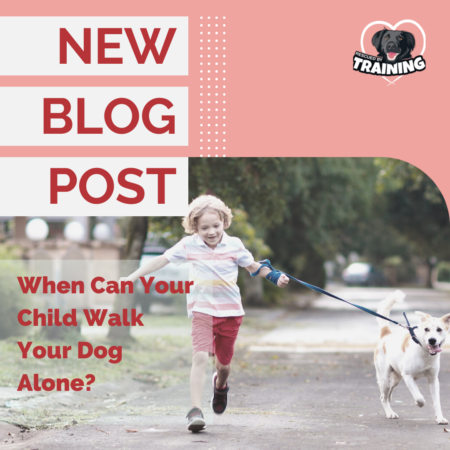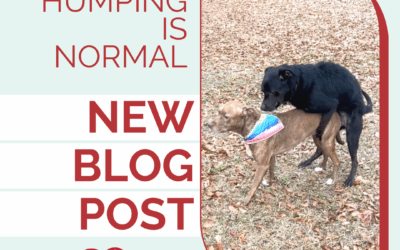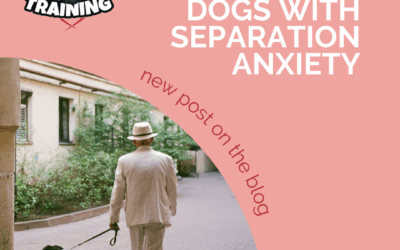Often during my family dog consults I get asked about when kids can walk the family dog alone. Many times a dog is added to the family to “help teach the kids responsibility” (by the way, not something I recommend) but usually parents are hoping they can entrust this seemingly easy task to kids and what an idyllic thing to see – your child walking your family dog around your neighborhood. These are the things Hallmark movies and Norman Rockwell paintings are made of.
So you can imagine their disappointment, and sometimes disbelief, when I tell them I don’t usually recommend kids walking dogs until the dog is a fully trained adult dog and the kids are mature in their own right. There are no hard and fast rules on when this might be but my general advice is usually around 13-18 for kids and 2-5 years old for the dog, where the kids and dogs have matured mentally and physically. The kids tend to be more responsible and able to make better choices and the dogs have reached social maturity and often mellow a bit. There will be exceptions of course, but this is my general guidance.
Why? Well, despite local social media groups advertising kids wanting to walk dogs for extra cash, dog walking is a skill. Professional dog walkers are insured, certified and trained in body language, leash and handling skills. Kids are not and there’s so much that could go wrong in a quick second. And it’s not necessarily anything to do with your own dog or child. Think of dog walking like driving – you might be a great, undistracted driver who always comes to complete stops at stop signs and never speeds but you can’t control the other drivers.
What are my concerns? What could go wrong?
- Dogs chase things. I’ve had many come to me after being knocked over or pulled over by their own dog. And these are adults. In fact, many years ago when I was out walking a young Barbo, he spotted some geese at the water’s edge (and I didn’t) and he took off after them, knocking me right off my feet. I had elbow and knee scabs and bruises as proof. In addition to wildlife, dogs might try to chase joggers, roller bladers, skateboarders, bikes, cars, little kids or any other number of interesting, fast moving things. Is your dog reliably redirectable from triggers, and does your child have the skills to know what to do in a situation like this? Does your dog have a rock solid recall if they were to get away?
- Dogs get loose. Even if your dog and child are perfect and do all the right things, you cannot control other owners or dogs. Dogs get out of yards or are off-leash in places they shouldn’t be. And many dogs do not respond well getting charged by an off-leash dog, even if they are social. But what if they’re not friendly? Would your child have the skills to know what to do if they encountered an off-leash dog? Honestly, many adults wouldn’t know what to do in this situation.
- Accidents happen. Leashes get dropped accidentally or dogs can slip out of collars or harnesses. One of the most heartbreaking stories I heard was from a family whose dog had been hit by a car and died, because their child was out walking the dog, accidentally dropped the leash and the dog ran into traffic. What a tragic loss of life and that child was left to cope with that. I wouldn’t want any child to endure that, and I doubt you would either.
- “It’s OK, he’s friendly!” People ignore leash laws or think that every dog wants to “say hi” to every other dog. Even when both dogs are social and friendly, on-leash greetings can go south quickly. And it’s even worse if one dog is on leash and the other isn’t. How would your child handle a situation where an adult owner was pushy about letting the dogs “say hi”?
- Dog body language is confusing. Many adults don’t know how to properly read dog body language. We cannot possibly expect children to have this skill. Not all tail wags are happy. Hackles up on a dog isn’t always bad. Barking, growling and lunging isn’t always aggression. Subtle head turns or weight shifts in a dog may signal the dog is done and asking for space but without knowing how to read these signs, we might inadvertently leave a dog in a situation they want out of. Would your child know how to read not only your dog’s body language but body language of other dogs they may be interacting with?
There are of course lots of factors that will play into your decision to let your child walk your dog or not. But I urge you to consider the potential risks not only for injury but legal liability if you allow a minor to walk a dog. I encourage you to be really honest with yourself about your dog’s skill set, triggers, reliability in responding to training cues and your child’s physical and mental ability to navigate the situations I outlined above. And certainly if your dog has any fear or aggression issues, we don’t want to saddle the responsibility of walking a dog with known behavioral issues on a child. Outside of that, consider these questions honestly as you navigate the decision about walking the family dog.
- Does your child get easily frustrated if your dog doesn’t respond to a cue right away?
- Does your child have a history of using food to reinforce good behavior with your dog?
- Is your child mature enough to be level headed under pressure and to say no to adults or to advocate for your dog in a situation we ask them not to get into, like on-leash greetings?
- What is the size and strength of your dog compared to your child? Weight matters – not because we’re using force with the dog but because physics is real. A 10 pound dog and a 100 pound child is very different than an 80 pound dog and and 80 pound child.
- Is your dog’s training reliable enough to respond with a variety of distractions in the real world?
- Is your dog friendly with strangers regardless of the person’s age, size, race, how they carry themselves or what activity they’re doing?
- Is your dog friendly with most dogs they meet or do they require careful introductions?
- Is your dog reactive to anything? People, wildlife, stray cats, bikes, cars, etc?
- Where do you walk your dog? A quiet suburban neighborhood might be less risky than a busy urban street.
- Does your dog walk without pulling or lunging using only a leash attached to a harness or flat collar?
- What kind of walking gear do you use? If you use a retractable leash, prong, choke or shock collar for walking you kid should not walk your dog. Even dogs who wear Haltis/Gentle Leaders, which I occasionally recommend for excessive pulling, shouldn’t be walked by a child.
Honestly thinking about the answers to these questions will guide your decision about who walks your family dog and the safety implications of your decision. If you need help navigating this or if your dog is already afraid of kids or strangers, you can set up a one on one fear and aggression consult to learn how to help them.
Happy training!
![]()




